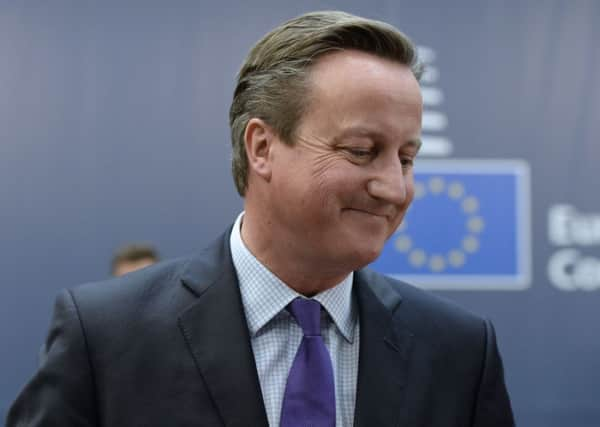Leaders: Chance for serious reform | Democratic deficit


The jostling for position has well and truly begun among the leaders of the European Union and the stakes could not be higher.
David Cameron will no doubt have set off more than a few jitters in Brussels yesterday when he started the countdown to Britain setting out its demands for reform.
Advertisement
Hide AdAdvertisement
Hide AdThe clock is already ticking towards an in-out referendum that Mr Cameron has promised the British people will be held by the end of 2017, but could well be held a lot earlier if the Prime Minister gets his way.
There appears to have been growing frustration and uncertainty over exactly what Britain wants to get out of renegotiations before the referendum campaign begins in earnest.
Discontent about the lack of clarity over Britain’s apparently toughening stance has bubbled to the surface again in the last 24 hours - but the Prime Minister appears to have finally bowed to demands for a detailed shopping list. He has vowed to “quicken the pace” of negotiations and even set a deadline for early next month to set out “four vital areas where we need change and laying down what those changes will be.”
While details remain elusive on exactly what these demands will be, already warning shots are being fired in Mr Cameron’s direction.
German chancellor Angela Merkel was among those taking fire, warning about non-negotiables like “the principle of free movement and the principle of non-discrimination”.
Belgium’s Prime Minister Charles Michel was also blunt, telling Mr Cameron in no uncertain terms to “put his cards on the table.” Speaking shortly before Mr Cameron’s arrival in Brussels for the latest summit of EU leaders, the president of the European parliament, Eric Schulz, made it clear that patience with Mr Cameron was running out, saying: “Above all, we need clarity on what we are going to be discussing over the next few months.”
Mr Cameron’s pledge ups the ante significantly as he will not want to suffer the humiliation of having any of his key demands rejected.
Mr Cameron is said to want to stage the referendum in the autumn of next year, once elections in Scotland and Wales are out of the way, but well ahead of elections in France and Germany in 2017.
Advertisement
Hide AdAdvertisement
Hide AdIt is not difficult to imagine the unforeseen consequences that could follow the EU referendum.
On Mr Cameron’s doorstep, a no vote would very probably lead to a second referendum on independence. With the SNP still way ahead in the polls ahead of next year’s election, a much closer result would seem very likely at this point.
But the ripple effects from the ongoing talks could be felt much wider depending on what Mr Cameron is able to secure. Many of the 27 other EU leaders may be confronted by backlashes in their own backyards if he gets his way.
So now is the time for them to seize the initiative to introduce meaningful reform.
There have been huge concerns over the issues of unaccountability, pervasiveness, wastefulness, bureaucracy and corruption across Europe. Rather than embark on a prolonged haggle with Britain, the other EU leaders should see this as an opportunity to give them serious attention.
Billionaires mask democratic deficit
A NEW wave of technology entrepreneurs is set have propelled China to the top of the global billionaire list.
A staggering 242 more have been created in the space of a year, despite a slowdown in its economy, allowing it to overtake the United States for the first time.
It was perhaps inevitable that this would happen given that China’s population is far greater.
Advertisement
Hide AdAdvertisement
Hide AdBut it is still an indicator of the pace of evolution in a country which can now boast 596 billionaires. Many others are thought to fly below the radar in a bid to conceal their true wealth from the Chinese authorities.
The Hurun Report, which produces China’s annual rich list, has reported the fastest growth in the country’s wealth creation since the index started 17 years ago.
The technology industry was the fastest-growing source of wealth, with the number of individuals from the industry on the list jumping 43 per cent compared to last year. But it was also notable that there were four property developers in the top ten.
The report reflected the success of online retailing, entertainment and other service businesses in the world’s second largest economy, which has seen a decline in traditional industries such as steel and natural resources.
With China now creating more wealth than any country has ever done before in the space of a year it may be tempting to regard the country as having fully embraced capitalism and become increasingly like the West.
However, its one-party state still ruthlessly dominates the country. China is still miles away from democracy and all the rights that are associated with it. If there is to be genuine progress on these fronts there will need to be much greater dialogue and trade links with the west.